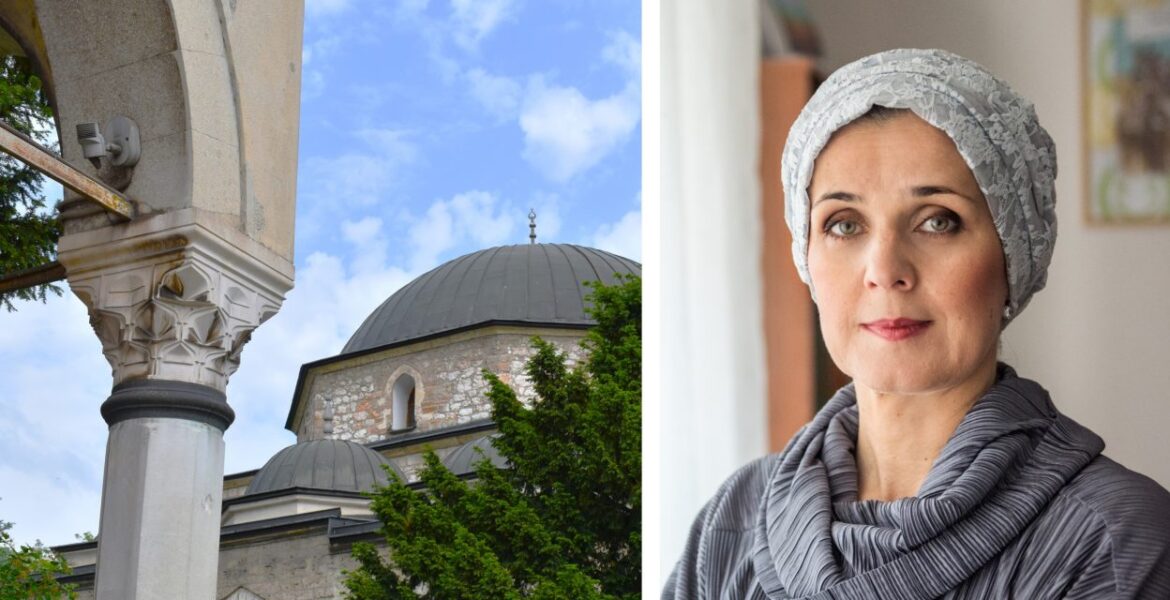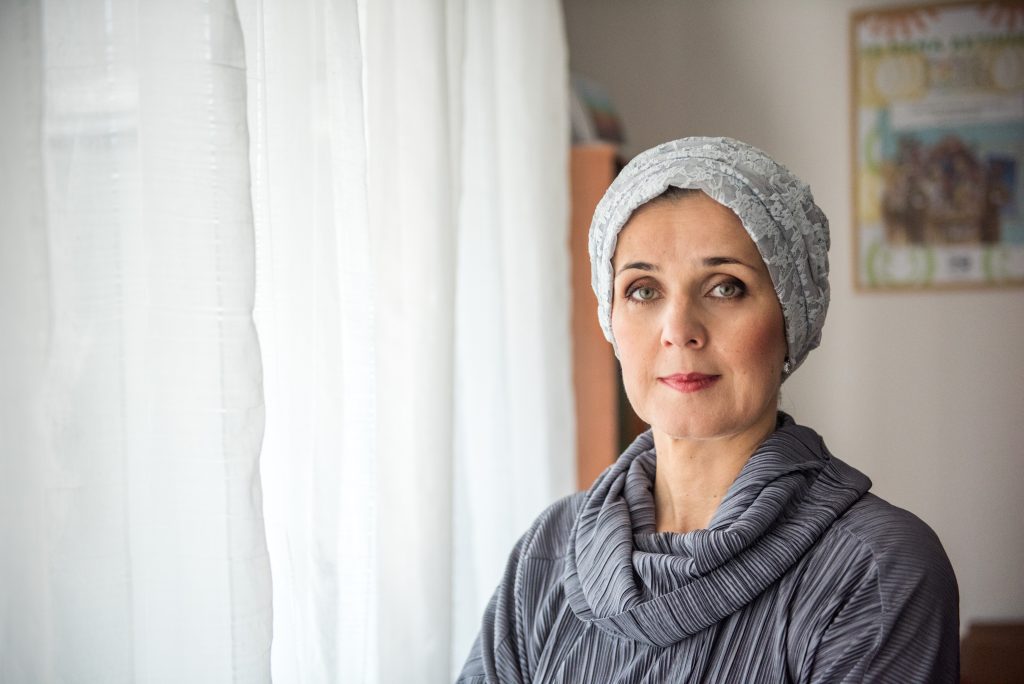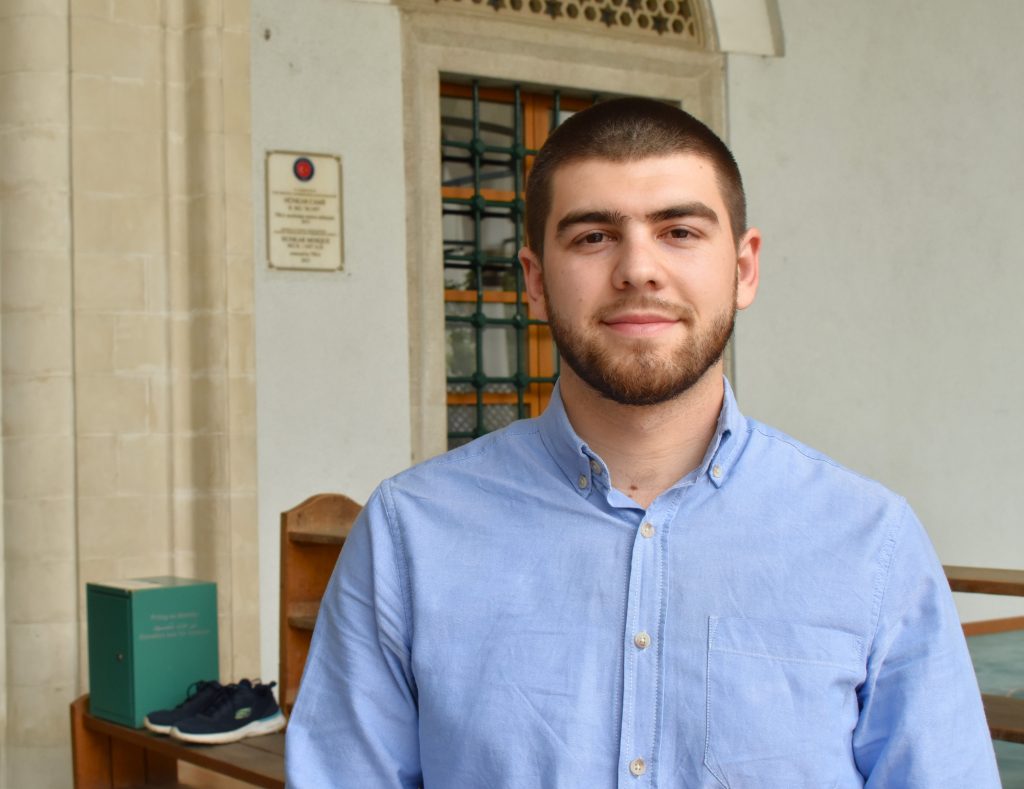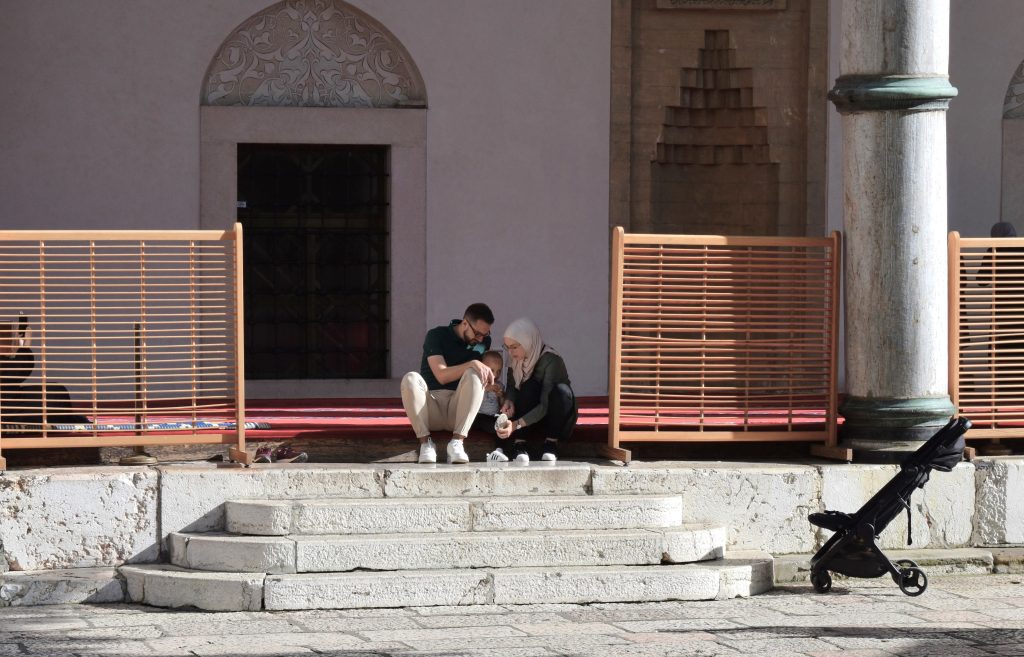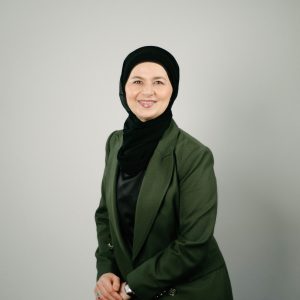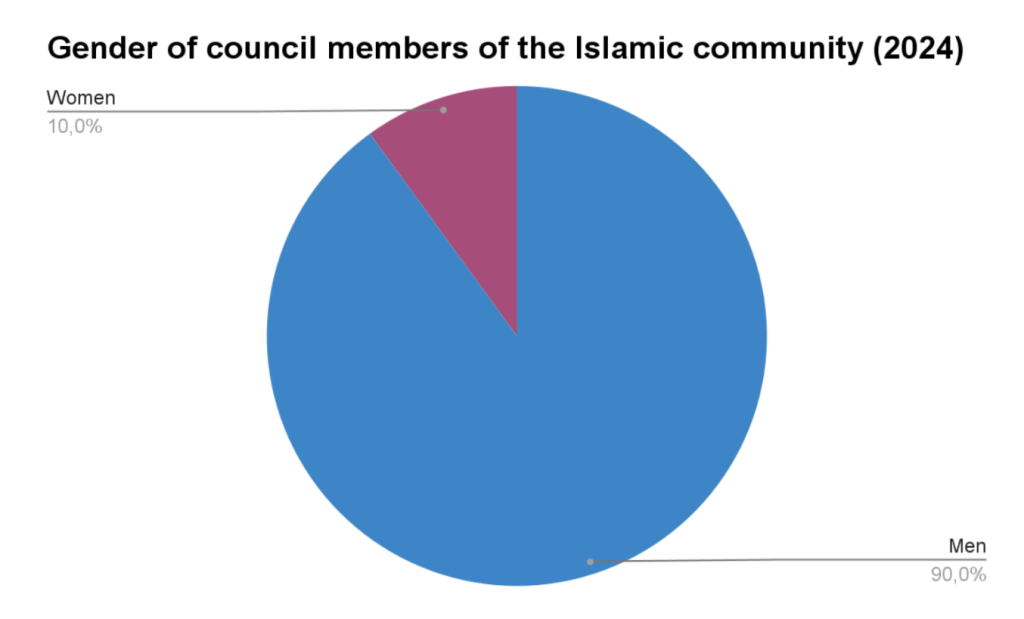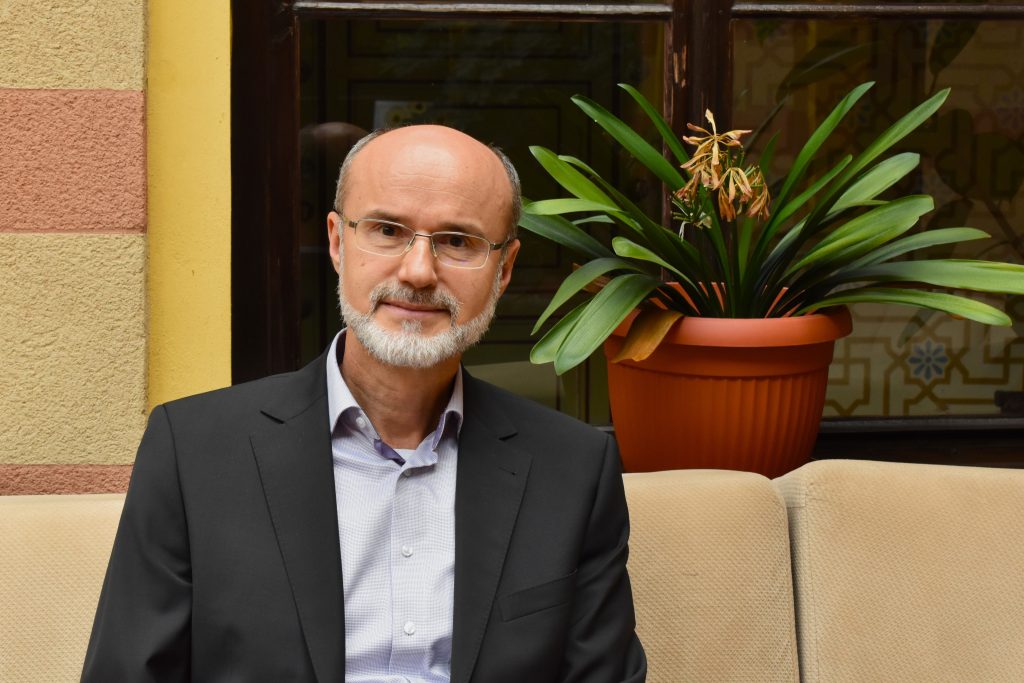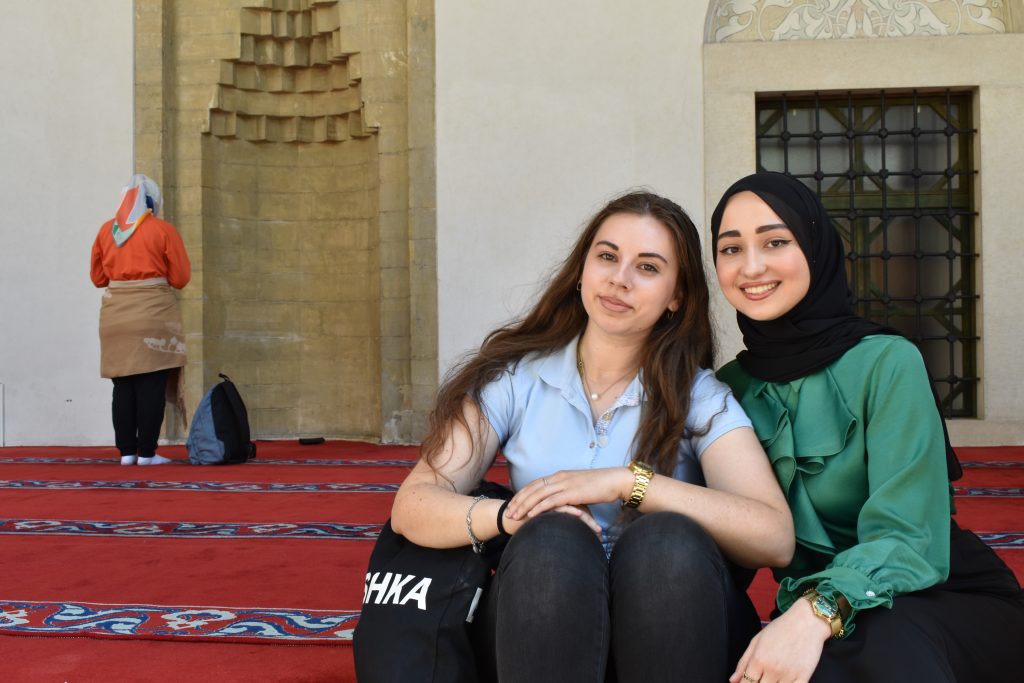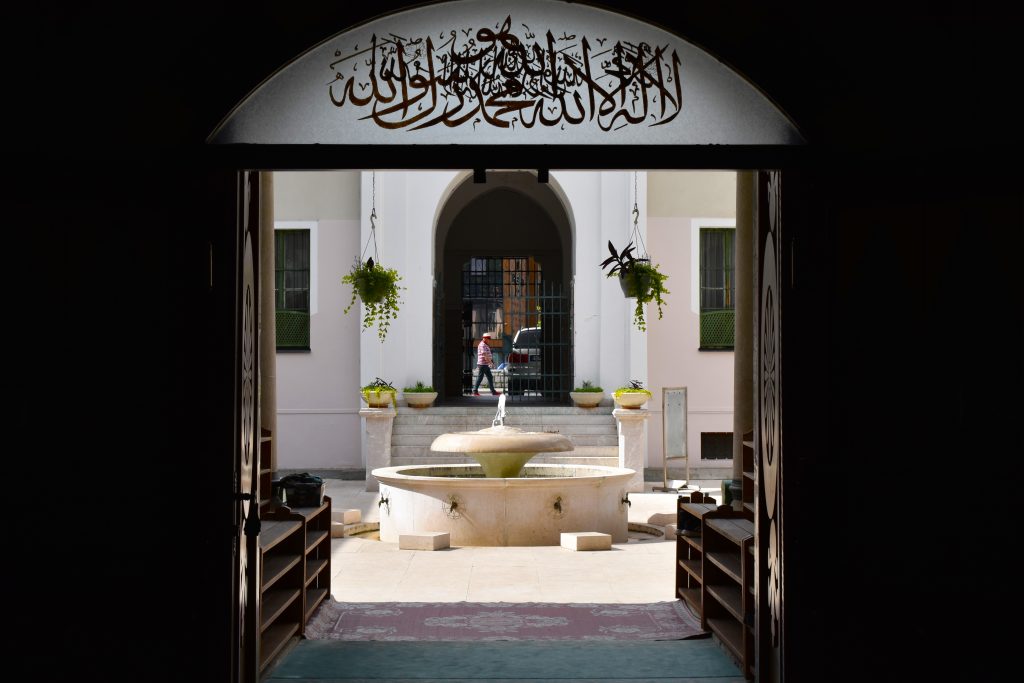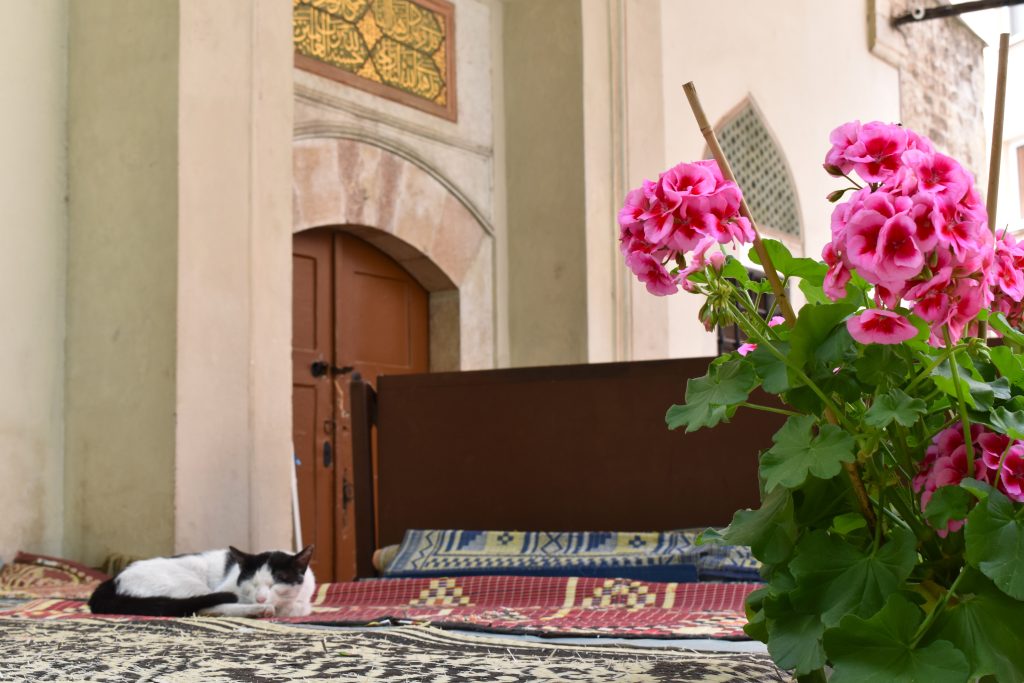The gender and religion professor Zilka Spahić Šiljak is in the forefront of fighting for Islamic feminism in Bosnia and Herzegovina. Through education and NGOs, she and other activists have managed to introduce feminist theology to a larger audience. Nonetheless, Islamic institutions and the anti-gender movement still oppose change.
SARAJEVO The call to Friday prayer echoes across the green hills of Sarajevo, and men flock to the historic Gazi Husrev-Beg mosque in the Old Town. The women, on the other hand, are asked to leave – they are not allowed to attend the Friday prayer at noon, called the ‘Jumu’ah prayer’, at this mosque.
It is patriarchal structures such as these, that prioritise the interests and needs of men, that Muslim feminists such as gender and religion studies professor Zilka Spahić Šiljak, are trying to change. She strongly believes that the Muslim community needs a new gender inclusive interpretation of the Quranic texts – which reflects the civilisational development.
“We try to reclaim religious narratives. We don’t want these groups to hijack the message of the Quran, and we want to highlight the key principles of justice and equality of all”.
Zilka Spahić Šiljak is one of the most prominent religion and gender studies research scholars in the region. Photo: Private.
| What is Islamic feminism?Islamic feminism seeks gender equality in an Islamic context, using Islamic sources as an argument for gender justice. Source: Encyclopedia.com. |
Marginalisation of Muslim women
Practising Muslim women face marginalisation both within their own religious community and the secular sphere, Zilka Spahić Šiljak points out.
“Most of the work they do is in feminised occupations – they do education and administrative work. But they are not represented in positions in the Islamic Community bodies”.
Gender stereotypes are prominent in Bosnia and Herzegovina and sometimes stand in the way of women fully exercising their rights, according to a report from UN Women. Statistics from the organisation show that 84 percent of young Bosnians see that cultural norms set different expectations for men and women in their communities.
Gender based violence is also a serious issue that Muslim women, as well as women in other religious groups, confront in Bosnia and Herzegovina. Data from the Organization for Security and co-Operation in Europe, OSCE, shows that 48 percent of Bosnian women have experienced some sort of physical or psychological abuse since the age of 15.
| History of Islam in Bosnia and HerzegovinaIslam came to Bosnia and Herzegovina with the Ottoman conquest in the 15th century. According to the last census from 2013 and a study from PEW Research, a little more than 50 percent of Bosnians are Muslim.The country is one of the only three European countries with a Muslim majority population, along with Kosovo and Albania. |
EXPLAINER VIDEO: The history of “Bosnian” Islam
*The subtitles are autogenerated with the use of AI.
“God gives power to who he wants”
The rise of ethnonationalism following the Bosnian war in 1992-1995 has further created a complicated landscape for feminism, Zilka Spahić Šiljak underlines. The Islamic feminism movement currently faces resistance from both conservative members in the religious institutions, and from the anti-gender movement. The anti-gender movement has had an increased influence in the country, according to the United Nations development program, and the movement frames gender equality as a threat to family life and religious traditions.
One of the Bosnian Muslims who do not agree with the idea of Islamic feminism is Hamdo Solo, assistant imam and masters student at the faculty of Islamic studies.
“I think they’re contrasts, like black and white. But I also think that Islam more than other religions gives rights to women”, he says, giving the example that women have had the right to vote and inherit since the beginning of Islam.
Hamdo Solo, assistant imam and master student at the Faculty of Islamic Studies, in front of the Emperor’s Mosque. Photo: Hanna Bäck.
He emphasises that the Quran states (in Surah an-Nisa 4:34) that men have been given the role to protect and take care of women.
“Our creator is Allah, and he knows better than us what is good or not for us. God is just, and he gives power to who he wants”, Hamdo Solo says.
Wins for the Islamic feminism movement
Nonetheless, Zilka Spahić Šiljak has seen the discourse change over the past three decades. Initially, few were willing to talk about feminism from a religious perspective. But with time and hard work, she and other activists managed to make Islamic feminism a part of the intellectual debate – and even the academic world.
The course ‘Gender and religion’ is now a part of some University programs in both Bosnia and Herzegovina, Serbia and Croatia. In 2021, Zilka Spahić Šiljak additionally founded the Feminism and Religion (FER) online school with her colleague Jadranka Rebeka Anić, where so far more than 250 students have analysed Islam, Christianity and Judaism from a gender equality perspective. Looking ahead, they want to integrate the FER school at the University of Sarajevo – which would be yet another step in making the topic more mainstream, Zilka Spahić Šiljak thinks.
Photo: Hanna Bäck.
Women’s organisations additionally play a big role in strengthening and educating women in local communities in Bosnia and Herzegovina. In 2006, Zilka Spahić Šiljak founded the TPO foundation to promote gender equality and intercultural dialogue. By working with schools, universities and local NGOs, the organisation aims to overcome the divide between secular and religious feminism, and activism and academia.
“It is particularly important to work with women in local grassroot organisations to create a groundswell for them to develop gender equality programs in accordance with their own needs”, she explains.
Other important organisations such as Nahla, Medica Zenica and Mali Koraci also carry out projects and activities that empower women, often in a faith-based context.
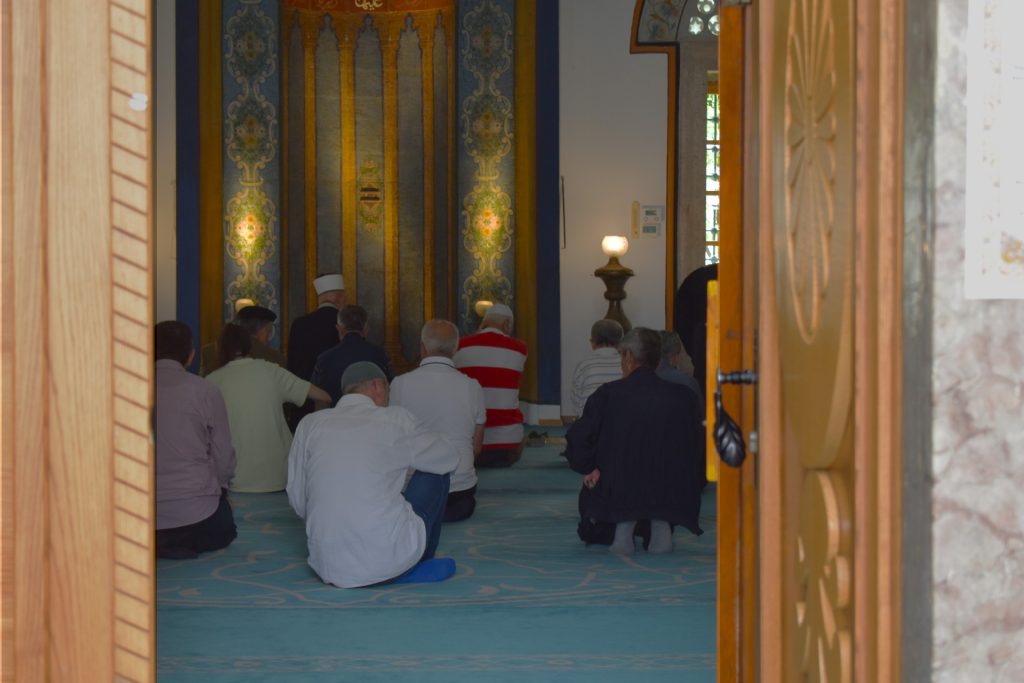
Photo: Hanna Bäck.
Patriarchal structures in the Islamic Community
But the successes of Islamic feminism have not only been limited to academia and civil society. In the last years, some positive steps have also been taken within Islamic institutions. Now, there is an increased number of women who work at the Islamic Community, which is the highest Islamic organisation in the country, managing jurisdiction and the mosques. The Grand Mufti Husein Kavazović has also mentioned that women should be more engaged in the Islamic Community.
| What is a mufti?A mufti is an Islamic jurist who gives nonbinding legal opinions about Islamic law.The Grand Mufti is the highest religious authority of a country. |
But on a deeper level, the patriarchal structures within the Islamic Community still run deep, according to Dževada Šuško, Chief-of-Office for international cooperation and Bosniak diaspora at the Islamic Community.
Dževada Šuško was the first and so far only woman to become a director of an institution of the Islamic Community. Photo: Private.
“There are not yet women on the levels where decisions are made. The mentality is that women are good workers, but that ‘we should keep our male circles for ourselves’”, she explains.
9 out of 87 current council members of the Islamic Community are women. Source: Islamic Community.
Faculty of Islamic studies
Just a few hundred metres from the Islamic Community’s headquarters stands the yellow and red-brown building of the Faculty of Islamic Studies at the University of Sarajevo. Professor Ahmet Alibašić explains that most of the teachers at the faculty are very supportive of female empowerment, and that they try to engage female colleagues as much as possible. In their short introduction program to Islam, they also have a module called ‘Women position in Islam and gender equality perspective’.
Ahmet Alibašić is a professor of Islamic civilisation at the Faculty of Islamic Studies at the University of Sarajevo. Photo: Hanna Bäck.
“I don’t think we ever intentionally sat down and set goals on what we should do in this regard, but it has been developing organically over time, reflecting the general attitude among the staff”, says Ahmet Alibašić.
However, he admits that the faculty has no official gender equality plan for the future.
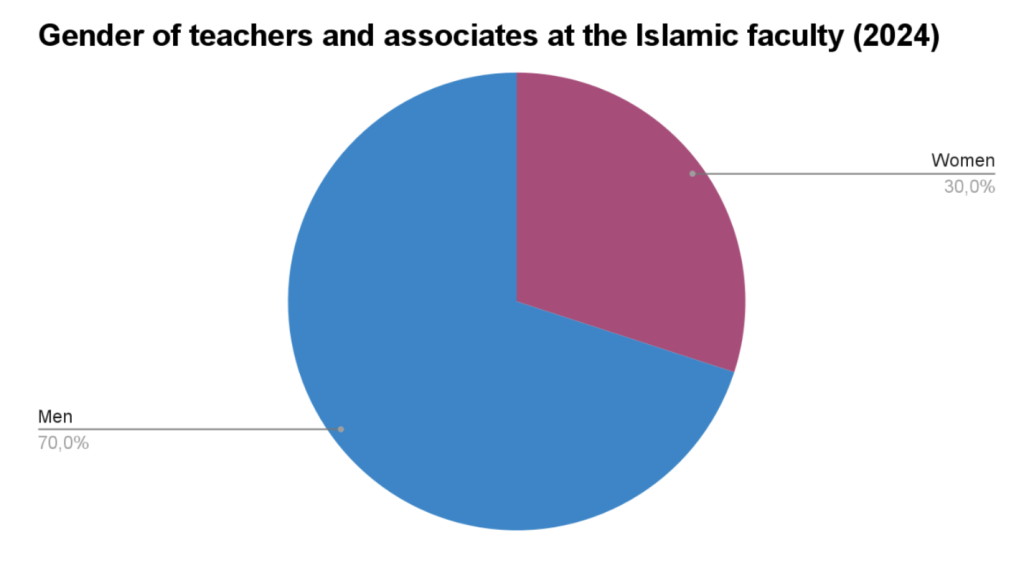
8 out of 27 teachers and associates at the Faculty of Islamic Studies are women. Source: Faculty of Islamic studies at the University of Sarajevo.
Differing opinions
Back in the Ottoman courtyard of the Gazi Husrev-Beg mosque, women and men are praying in the shade of the terraces. Here, as in the Muslim community in general, the practitioners have varying opinions about Islamic feminism. Elma, a young Muslim girl who prefers to not go by her last name in the article, explains that she does not find Islam and feminism compatible.
“I don’t like feminism, I don’t think that is for us in this religion. Allah knows what is best for women and men, and did not create us to be equal”, she says.
The pharmacy student Sejida Babić on the other hand thinks that Islam is a very feminist religion at its core, but that some people stray away from its original ideas of female empowerment.
“Women are very holy in Islam. I just think that our society does not represent it in the best way – we don’t do it as Allah wanted to”, says Sejida Babić.
From the right: Sejida Babić and her friend Dželila Topalović sitting in front of the Gazi Husrev-Beg mosque. They come here often to either pray or relax. Photo: Hanna Bäck.
Shift in mentality
However, there are signs that the mentality is slowly shifting among some influential figures in the Islamic Community. Last December, Zilka Spahić Šiljak wrote an article where she strongly criticised Muslim religious leaders who interpret the Quran in a way that allows men to physically discipline their wives if they are disobedient.
One of the people she denounced was Senaid Zajimović – a director of the Islamic Community. However, after the article, he responded and clarified that he had changed his opinion on the subject. In his new interpretation, he abandons the patriarchal interpretation of marriage, underlining that men and women are equal in the eyes of God. The fact that he publicly changed his interpretation is an important step in the right direction, Zilka Spahić Šiljak accentuates.
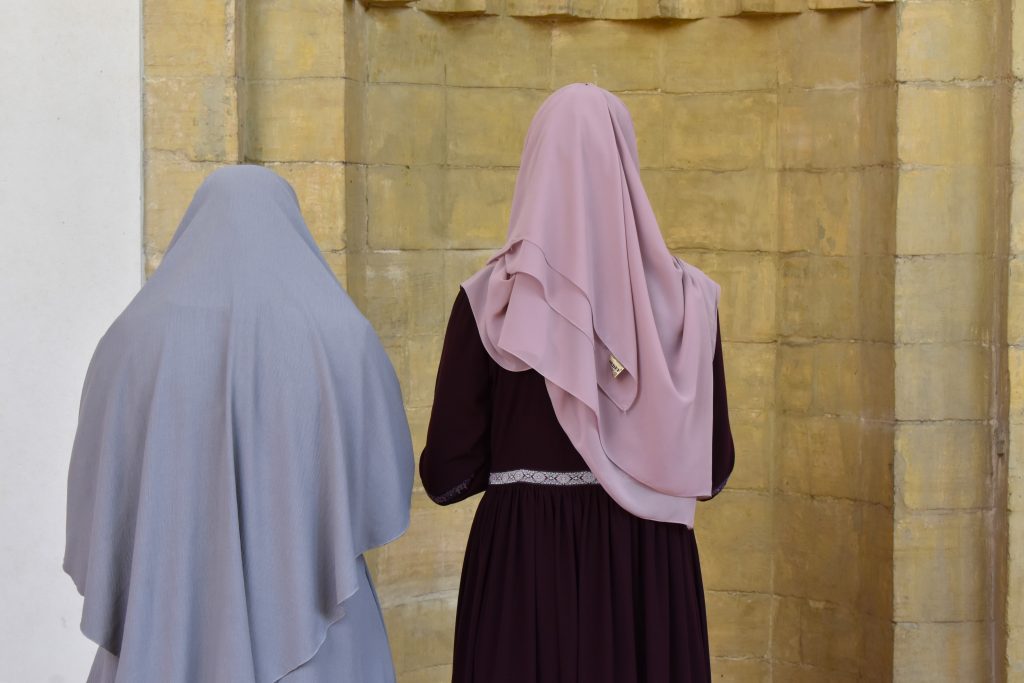
Photo: Hanna Bäck.
Fighting the anti-gender movement
But even though the movement of Islamic feminism is gaining more traction in Bosnia and Herzegovina, the anti-gender movement is also gaining influence – seeking to reinforce traditional gender roles and defy gender equality initiatives.
The anti-gender trend is for instance displayed in Republika Srpska (RS), which is one of the two entities of Bosnia and Herzegovina. There, the government abandoned the new law on violence against women, which would have included the term ‘femicide’ for the first time.
Conservative Muslim influencers on social media, such as the popular Elvedin Pezić, also spread anti-gender views. On his Facebook page he wrote that “Western society morally collapsed the moment they took the woman out of the house and when the woman became everything but a mother”.
Zilka Spahić Šiljak sees the movement as a great threat to women’s rights, and thinks that it has made the polarisation more noticeable between secular and religious feminists, and traditional and progressive Muslims. In the future, she fears that the anti-gender movement could further strengthen patriarchal interpretations of the Quranic texts.
“In general, misinterpretations go hand in hand with these anti-gender movements to promote traditional gender roles, to bring women home and to control their reproductive rights”, she says.
Photo: Hanna Bäck.
The future of Islamic feminism
One of the most important steps in creating a more equal future, would be that Bosnian women and men equally take part in decision-making – in both religious communities and state matters, Zilka Spahić Šiljak points out.
Equal participation is important, because the decision-makers often overlook the needs and interests of women. But even women who are not aware of patriarchal structures sometimes disregard the interest of women, she adds, pointing out that education about patriarchal structures is also another important aspect.
In the future, Dževada Šuško underlines that the Grand Mufti and the muftis in Bosnia and Herzegovina could play an essential role in promoting gender equality.
“If the Grand Mufti would decide that we need to have one or two women in our decision-making instances, it would really make a radical change”, she says.
Photo: Hanna Bäck.
It remains to be seen how the movement of Islamic feminism develops in the country in the future. But Zilka Spahić Šiljak underlines that even though it will take a lot of time and hard work, she cannot but believe in a future with gender equality – in the Muslim community and in society in general.
“It is really hard, but we need to be creative. We need to have the moral imagination to envisage what kind of society we want for our daughters and granddaughters”, she says.
Izvor: https://svjmedia.nl/internationaljournalism/12831/how-a-bosnian-movement-is-putting-islamic-feminism-on-the-map/

